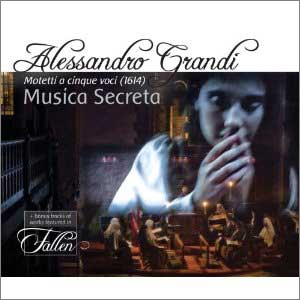Alessandro Grandi
£10.00
Motetti a cinque voci (1614)
- CDs
- CDs signed by Laurie Stras and Deborah Roberts
- Download available from our shop on Bandcamp
Description
Alessandro Grandi’s Motetti a cinque voci (1614) was dedicated to Duchess Margherita Gonzaga d’Este, seven years after she left Ferrara a widow in 1597. As Ferrara reverted to the Papal States, the court was sent to Modena and the famous concerto delle donne, who had been Margherita’s companions since her arrival in Ferrare in 1579, were disbanded. Margherita returned to her brother Vincenzo’s court at her native Mantua, the dowager duchess of nowhere.
In 1599, she began the process of establishing the Clarissan convent of Sant’Orsola, where she eventually ended her days, happily living at the convent and singing daily with the sisters. Because Grandi presumably was still just an aspiring young man with no great contacts, his motets were presented to Margherita by Placido Marcelli, one of her husband’s musicians, with a dedication that invoked the previous glories of Ferrarese music.
We perform them on this disc in arrangements that follow the practice of convent music in the sixteenth and seventeenth centuries: with occasional octave transposition of lower vocal parts and full instrumental accompaniment.
Also included on the disc are other works included in our 2006 multimedia performance event, Fallen: music by Josquin des Prez, Giaches de Wert, Lodovico Agostini, and Cosimo Bottegari.
Additional information
| Weight | 0.092 kg |
|---|
Press Reviews
This isn’t your run-of-the-mill recording of an early seventeenth century motet collection. Instead of merely accepting the music at face value, as originally published, we are invited to make a leap of faith and enter the cloistered world of an Italian convent and imagine the performances are given by an ensemble of nuns.
This approach is inspired by the original dedicatee of the Motetti a cinque voci (1614): the well-connected Margherita Gonzaga d’Este, widow of Alfonso II d’Este and a great lover and patroness of the arts. When her husband died she returned to Mantua, her birthplace, and in 1599 founded the Clarissan convent of Sant’Orsola, to which she retired. Sensibly, she never took holy vows herself, which meant she enjoyed extra worldly privileges and successfully petitioned the Pope to allow the singing of polyphony at the convent. Whether the music of Alessandro Grandi’s third book of motets was ever actually heard at Sant’Orsola is unknown, but what is certain is that the motets could not have been performed in their published form for a mixed ensemble of high and low (male ) voices.
The directors of Musica Secreta make a perfectly valid case for transposing and arranging the music to suit an all-female ensemble plus a continuo group of harp, lute and organ: such pragmatic adaptation was part and parcel of musical life at the time. My only reservations really are where a couple of the motets have been transposed up a fourth and sound very high, especially Versa est in luctum cithara mea, which has too bright a sonority for a funeral motet. Full details of all the changes made to each piece are meticulously detailed in the accompanying booklet.
The performances here would surely have delighted Margherita, not only in their technical accomplishment but also in their self-effacing modesty. Though the texts are beautifully expressed, the approach is not a strongly rhetorical one. In the highly wrought Amina mea liquefacta (My soul is melted), the contrasts of mood and sonority are handled with the utmost refinement. Here, as elsewhere, there’s a strong metrical pulse to the performances, which sometimes could have been relaxed a fraction to considerable expressive advantage. We are also treated to six bonus tracks which Musica Secreta uses in its theatre piece Fallen, based on the life of a young nun in Ferrara. Wert’s motet Vox in Rama audita est (1581) is hauntingly sung by Catherine King, with the three other voice parts taken by harp, lute and organ. Overall, this is beautifully refined music-making – sonorous, soulful and sincere. International Record Review Like the fools in the poem by Goldsmith, I came to scoff and remain’d – well, not to pray, but certainly to admire. Alessandro Grandi was appointed deputy to Monteverdi at St. Mark’s in Venice in 1620, having joined the choir three years earlier. However, these motets were published in 1614, when Grandi was still a maestro di cappella in Ferrara. They are scored, in five parts, for the usual mixed voices. Musica Secreta is an all-female group; I don’t see the point of, for instance, a soprano singing Winterreise, hence the scoffing. But actually it works very well, the tenor and bass parts transposed up an octave and a continuo group providing firm support.
Less successful are the two motets transposed up a fourth, where a slight sense of strain is apparent. Like Monteverdi, Grandi faces both ways: backwards with counterpoint, forwards with monody. Several motets start with solo voice and continuo, the other parts joining later. Whether singing solo or as an ensemble, the ladies of Musica Secreta sound beautiful, the bright sopranos of Deborah Roberts and Tessa Bonner complemented by the throaty alto of Caroline Trevor. One of the most appealing motets is “Quo rubicunda rosa”, which begins with a duet and becomes quite Venetian in its antiphonal exchanges. To be honest, the overall effect is bland. Grandi’s melodies fall easily on the ear, but all too rarely are they spiked with chromaticism, “Versa est in luctum” being an exception. In some of the pieces by other composers, the ensemble is joined by the eight-strong Celestial Sirens. The variety of texture is welcome, though the most moving singing comes from Catherine King in “Vox in Rama”, done as a solo with instruments. The booklet is badly laid out. An enterprising disc all the same, well worth hearing. Gramophone An ensemble of female singers with a mixed-sex continuo team of organ, harp and chitarrone, Musica Secreta has driven the vogue for music written by or for the female musicians of 17th- century Venice and Ferrara. In this recording of Alessandro Grandi’s five-part motets, they extend their repertoire, presenting arrangements after those of the nuns of the Clarissan convent of Sant’Orsola, Mantua. With tenor or bass lines transposed up an octave or replaced by the instruments, the effect is a little like being caught in a rugby scrum of enthusiastic angels. Yet the singing is never less than vivacious and artful. The Independent on Sunday
The music has a curiously weightless quality … polished and delineated…. The Guardian
You must be logged in to post a review.






Reviews
There are no reviews yet.